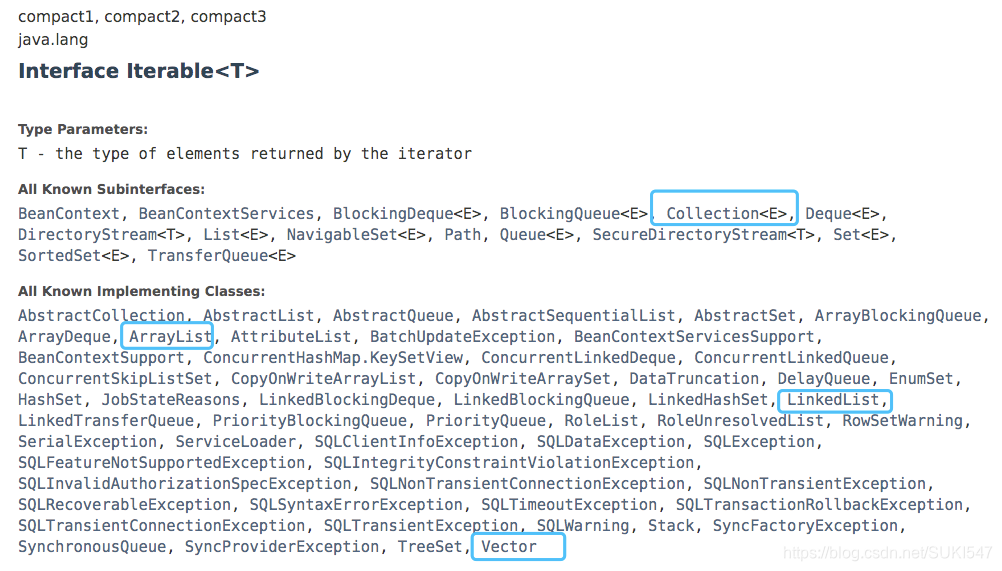




Iterator迭代器
- 迭代器是一种模式,使数据结构的遍历行为与被遍历的对象分离,即无需关心该序列的底层结构是什么样子的。只要拿到这个对象,使用迭代器就可以遍历这个对象的内部。
- 注意:迭代出来的元素都是原来集合元素的拷贝。
Java集合中保存的元素实质是对象的引用,而非对象本身。
迭代出的对象也是引用的拷贝,结果还是引用。那么如果集合中保存的元素是可变类型的,那么可以通过迭代出的元素修改原集合中的对象。 - 那么当Iterator访问Collection集合中元素时,Collection的元素不能改变(多个线程的修改),只能通过Iterator的remove()方法删除。否则会引发ModificationException异常(异常原因简单来说是iterator源代码在检查modCount的值,这个值被ArrayList改变时抛出异常)
- Iterator对集合类中的任何一个实现类,都可以返回这样一个Iterator对象。可以适用于任何一个类。
- 从数据结构角度分析,for循环适合访问顺序结构,可以根据下标快速获取指定元素.而Iterator 适合访问链式结构,因为迭代器是通过next()和Pre()来定位的.可以访问没有顺序的集合.
- 而使用 Iterator 的好处在于可以使用相同方式去遍历集合中元素,而不用考虑集合类的内部实现(只要它实现了 java.lang.Iterable 接口),如果使用 Iterator 来遍历集合中元素,一旦不再使用 List 转而使用 Set 来组织数据,那遍历元素的代码不用做任何修改,如果使用 for 来遍历,那所有遍历此集合的算法都得做相应调整,因为List有序,Set无序,结构不同,他们的访问算法也不一样.(还是说明了一点遍历和集合本身分离了)
————————————————
原文链接:https://blog.csdn.net/Jae_Wang/article/details/80526216
| Iterator | ListIterator |
|---|---|
E next() |
E next() |
boolean hasNext() |
boolean hasNext() |
default void remove() 最后一个元素 |
void remove() ( next()/previous()返回的最后一个元素) |
default void forEachRemaining(Consumer<? super E> action) |
x |
| x | boolean hasPrevious() |
| x | int nextIndex() |
| x | int previousIndex() |
| x | E previous() |
| x | void set(E e) next()/previous()返回的最后一个元素 |
| x | void add(E e) |
iterator只能顺序访问,ListIterator可以倒序访问、追加、重写
ArrayList 与Vector
-
ArrayList出现于jdk1.2,vector出现于1.0.两者底层的数据存储都使用的Object数组实现,
因为是数组实现,所以具有 查找快(因为数组的每个元素的首地址是可以得到的,数组是0序的,所以: 被访问元素的首地址=首地址+元素类型字节数*下标 ),增删慢(因为往数组中间增删元素时,会导致后面所有元素地址的改变)的特点. -
线程的安全性不同,vector是线程安全的,在vector的大多数方法都使用synchronized关键字修饰,arrayList是线程不安全的(可以通过Collections.synchronizedList()实现线程安全)
-
性能上的差别,由于vector的方法都有同步锁,在方法执行时需要加锁、解锁,所以在执行过程中效率会低于ArrayList,另外,性能上的差别还体现在底层的Object数组上
————————————————
原文链接:https://blog.csdn.net/qq_37113604/article/details/80836025
方法比较
| ArrayList方法 | Vector方法 |
|---|---|
| boolean add(E e) | ~ |
| void add(int index, E element) | ~ |
| boolean addAll(Collection<? extends E> c) | ~ |
| boolean addAll(int index, Collection<? extends E> c) | ~ |
| x | void addElement(E obj) |
| x | int capacity() 当前容量 |
| void clear() | ~ |
| Object clone() | ~ |
| boolean contains(Object o) | ~ |
| void ensureCapacity(int minCapacity) | ~ |
| x | boolean containsAll(Collection<?> c) |
| x | void copyInto(Object[] anArray) |
| x | E elementAt(int index) |
| x | Enumeration elements() |
| x | boolean equals(Object o) |
| x | E firstElement() |
| void forEach(Consumer<? super E> action) | ~ |
| E get(int index) | ~ |
| x | int hashCode() |
| int indexOf(Object o) | ~ |
| x | int indexOf(Object o, int index) |
| x | void insertElementAt(E obj, int index) |
| boolean isEmpty() | ~ |
| Iterator< E> iterator() | ~ |
| x | E lastElement() |
| int lastIndexOf(Object o) | ~ |
| x | int lastIndexOf(Object o, int index) |
| ListIterator < E> listIterator() | ~ |
| ListIterator< E> listIterator(int index) | ~ |
| E remove(int index) | ~ |
| boolean remove(Object o) | ~ |
| boolean removeAll(Collection<?> c) | ~ |
| x | void removeAllElements() |
| x | boolean removeElement(Object obj) |
| x | void removeElementAt(int index) |
| boolean removeIf(Predicate<? super E> filter) | ~ |
| protected void removeRange(int fromIndex, int toIndex) | ~ |
| void replaceAll(UnaryOperator< E> operator) | ~ |
| boolean retainAll(Collection<?> c) | ~ |
| E set(int index, E element) | ~ |
| x | void setElementAt(E obj, int index) |
| x | void setSize(int newSize) |
| int size() | ~ |
| void sort(Comparator<? super E> c) | ~ |
| List< E> subList(int fromIndex, int toIndex) | ~ |
| Object[] toArray() | ~ |
| x | String toString() |

